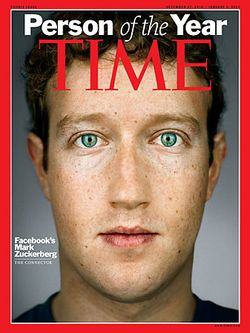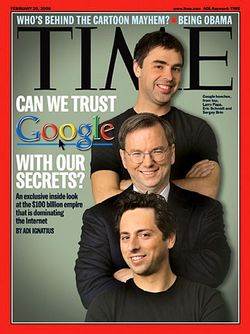
I suspect I will meet many executives there concerned about the future of their business:
- What with Apple and Microsoft making big gains in the mobile space, pushing open source out of their app stores.
- What with Oracle taking over big open source projects like OpenOffice, mySQL, and Java, then squeezing the life of them for short-term gain.
The message I have for them is quite different.
Today is the Golden Age of open source.

What these services, and others, have in common is that they were built with open source tools, almost exclusively. The shared infrastructure of open source tools let small teams build big things quickly, then scale them on the Internet, itself a product of open, royalty-free standards.
The big money in open source, it turns out, isn't in 50-somethings signing support contracts with enterprises, or 40-somethings putting open source software into hardware ordered from 30-something factory owners and made by under-10s and teenagers. It lies in the creation of online services by 20-somethings, because services scale quickly.
But this could not have happened a decade ago. Before the rise of the LAMP stack (Facebook is built on a LAMP stack), virtualization (Xen) and the cloud (Hadoop), there was little a Web host could do when a crowd “rushed to the rail” and hit a server with millions of file requests, all of a sudden. And if all those clients were doing database look-ups then, as my people in New York would say, fuhgetaboutit.

And they really don't want to be in the social space. The 20-somethings are now in a cutthroat war for market share, one that is looking a lot like the “music wars” of the 1950s, only without the suits in the back controlling everything. Despite their enormous valuations, these companies are always going to be high risk ventures – ask the guys at MySpace. Issues of reputation, a need to constantly innovate, to stay on top of both youth culture and word of mouse – it's a young man's game.
Meanwhile Google rakes in the chips, ever-escalating demand monetized regularly through its ad networks. It does well by doing good, Android being just one example, and it doesn't have to get greedy. In fact the only reason Google doesn't want to compete with the phone companies today is because it would win, win too easily, and thus come under serious antitrust scrutiny. AT&T is practically its beard. Wall Street understands this. It's why Google, age 14, is worth more than AT&T, which is almost 10 times older.
All of this was made possible by the miracle of open source, of shared software infrastructure. Without it, Google couldn't have grown so fast, Facebook and its acolytes wouldn't exist at all. So while it's fun to worry about Red Hat, and how we're going to make people pay for something they can download for nothing, that's really a side-issue, one niche's problem.
The golden age of open source is now.










One of the most persistent criticisms of open source is that it is not innovative, but is simply a re-working of other people’s ideas.
One of the most persistent criticisms of open source is that it is not innovative, but is simply a re-working of other people’s ideas.
Dane – you’re a real rebirth man. We, as visitors, never know what to anticipate when a new publish of yours bursts up, but it’s always interesting.
Dane – you’re a real rebirth man. We, as visitors, never know what to anticipate when a new publish of yours bursts up, but it’s always interesting.